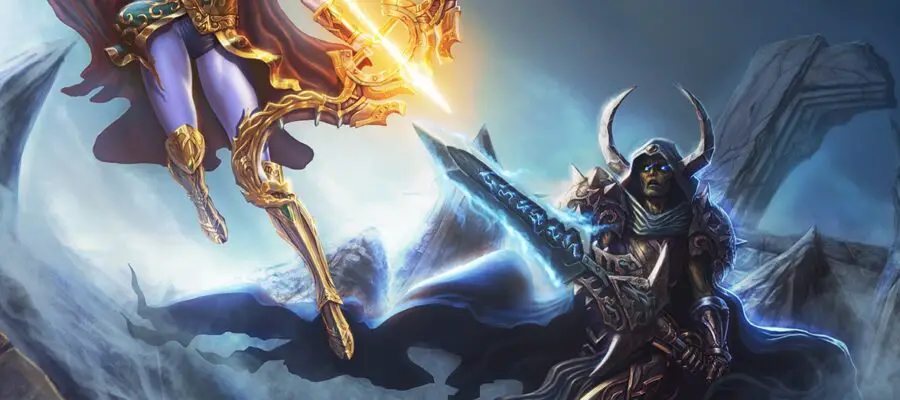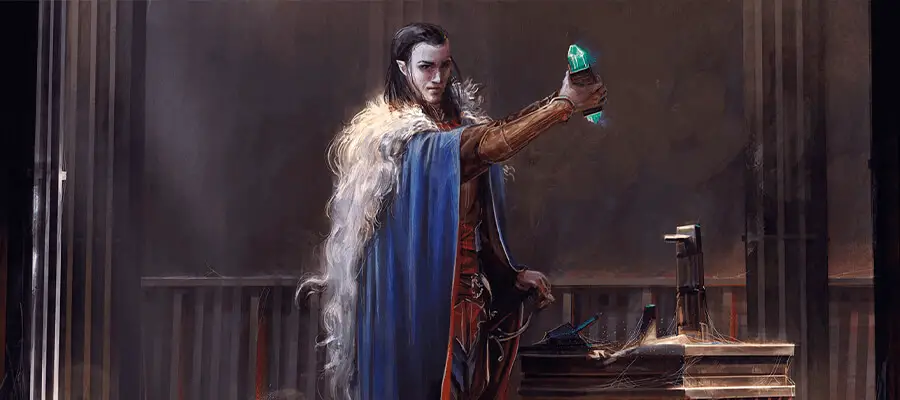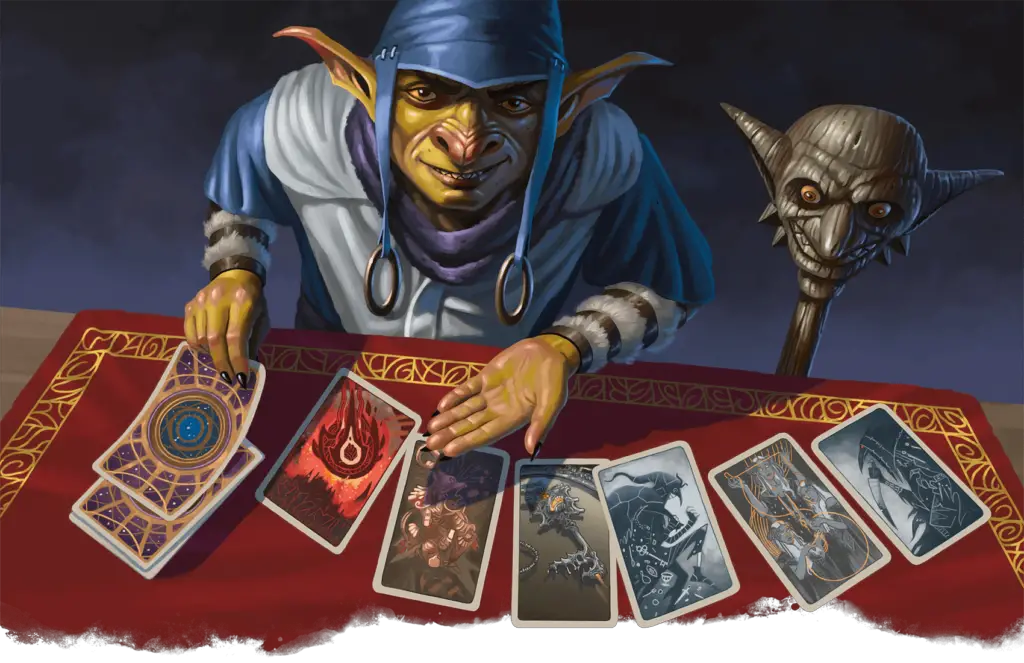Featured art “Elf Archer VS Undead Warrior + VIDEO (Wow)” by TSABER. Creative Commons License.
This article contains affiliate links that add gold to our coffers.
I recently acquired a pet peeve. It’s born out of popular D&D interviews, videos, and blogs that comment on the meta-game and how powerful characters are bad, don’t matter, or reflect poorly on their players. I want to clear up half-baked opinions that are miscommunicated or ill-advised. I will outline the assertions that concern me enough to write this article.
The summation of my concern is that people playing D&D for a living are venturing into the extremes of an individual style of gameplay that doesn’t apply to everyone. I believe they need to vary the people they play with to mature their opinions. Again, these people have heaps of experience, and I believe they’re trying to give sound advice. I’m addressing the nuances and blindspots of their points.
Before we get too far into this, I will say that it is also ok to make character choices that are not “optimal” for a given game mechanic. Ginny D made a great video about this, but the caveat is that I recommend this for experienced players who know what they’re doing. I’ve never seen a new player get psyched about how much their character fails at their rolls, and their spells don’t work because they’ve chosen save-or-do-nothing spells that all require concentration.
I’ve been playing for years, and I’ve enjoyed making alternative character choices that aren’t “the best” options. Opal and I have written multiple character-concept articles that wouldn’t be classified as optimal character builds, but they sound fun to play. I love creating memories with spells that nobody uses. With that in mind, let me expound on why I provide this caveat…
I’ll focus on two gaming principles that are especially important to me and this discussion to make my points. These principles will assist you in understanding my thesis that follows:
(1) Vices are not the opposites of virtues—they are the extremes with virtues balanced in the middle. For example, a rules lawyer is one extreme, and a clueless player is the other extreme. A balanced player is in the middle with knowledge of the rules and the flexibility to depart from them. Another example would be someone who only roleplays and resents combat as one extreme and someone who only likes fighting and tunes out the roleplaying; a balanced player is in the middle, seeking to enjoy all aspects of the game.
People devote so much time to playing D&D that they might as well seek balance in their playstyles and attitudes. I like to think many players seek this state of zen, prompting them to discuss and pursue community online with other TTRPG hobbyists.
(2) It is fun-breaking or irresponsible to break, change, or be ignorant to a system’s rules until you learn and become proficient with those rules through experience. Disregarding rules before they’re understood will likely cause a game to devolve into nothingness. The better you know the rules, the more you’ll know when they should be broken. Rules become guidelines only when you master them.
I refer to these points as principles on purpose. ‘Rules’ sounds more rigid, but ‘principles’ are meant to guide. Keeping these philosophies in mind, let’s discuss some of the D&D advice on the internet that I believe is questionable due to violations of the core principles that I described.
Before we get too deep into this article, I am not saying roleplaying or optimizing is better than the other. They should be balanced together to enjoy D&D to its fullest. This article has no intention of justifying behavior that is inconsiderate, abusive, rude, spiteful, or in any way being a jerk.
You can also watch my YouTube video that covers this article if you prefer to listen:
Myth: Roleplaying and Optimizing Are Mutually Exclusive
The ultimate tabletop RPG experience comes from a relationship between understanding the rules of whatever system you’re using and the roleplaying of the characters you imagine. I read many comments from players and DMs who speak as if you can’t optimize a character and roleplay well. The truth is that these two concepts are matches made in heaven. Each player should seek to improve both.
I learned heaps of lessons from my decade of improv experience. One of those lessons is that being creative is more fun with a prompt. Each prompt that an improviser receives is like a box. Improvisers bounce around that box like a Windows 95 screensaver or fireworks in an oven. It’s more fun to be comedic with a prompt from the audience because it’s like a challenge to overcome. Rules—such as a character’s class, skills, and stats—give players a way to be uniform with their imaginations. This creates consistency, so roleplaying can emerge from order.
Without rules for an RPG system, we’re all just playing pretend as we did when we were children. Adults don’t tend to enjoy playing pretend, but they widely embrace systems for creativity. This is true for basketball, football, Hide and Seek, Capture the Flag, and nearly any game other than Calvin Ball. Would anyone make an argument that the greatest sports stars and athletes can succeed with talent alone and no knowledge of the rules of the games they play?
D&D is different because it doesn’t involve two teams competing for victory, but the point still stands that rules and talent interact to create a spectacle. This is part of what makes D&D special. You don’t have to ‘win’ against your friends. The lack of competition in D&D is one reason I’m puzzled by players who allegedly resent their fellows who have efficiently utilized game mechanics. Even if those players don’t roleplay, there is no reason to resent them unless someone is jealous of how much they don’t know the rules themselves (assuming the optimizer isn’t a jerk, duh). In that case, the heavy roleplayer can seek a group of people who care about roleplaying more than rules. There’s no need for roleplayers to resent optimizers or vice versa.
Mechanical weaknesses are not solely based on character creation and stats, either. I point this out because character creation has been the center of this discussion. Some characters multiclass too much, or they do so at mechanically disadvantageous times, but perhaps this is done for narrative value (common with multiclassing Warlocks, for some reason). Spellcasters may choose spells that are too niche, possibly because a player literally hasn’t had the chance to use those spells and wants to try them. I find it exciting to use a spell that I’ve never seen used successfully. Memorable moments are forged when other players exclaim about how they’ve never heard of that spell or never seen it used. This is an example of making statistically sub-optimal choices that eventually pay off big time.
The most frustrating scenarios that involve optimization have nothing to do with character choices; they have to do with player choices and player personalities during game sessions. It’s frustrating when Wizards don’t mind casting Fireball on top of their allies while enemies get shaken out of a harmless stupor from another player character’s Hypnotic Pattern. That’s the kind of situation that makes players look at each other in frustrated disbelief. Nobody is frustrated that the player created a Wizard that can use Fireball, but they sure don’t like how the player is running that character.
I digress, but the main point I want to convey is that optimization and roleplaying are two skills to develop for a more excellent gaming experience. Optimizations are meant to make a character good at something, and it often comes with the downside of being bad at something else. D&D is pretty good at not allowing one character to steal the show all the time, no matter how optimized a character is.
Since you’ve been exposed to my thesis, let’s explore other points of view that I’m questioning.
Questionable Advice from Popular D&D Influencers
Here is a collection of questionable advice and statements from popular D&D content creators (anonymous). I’ll address them one by one later in this article because they contain ounces of wisdom in a cup of misdirection:
Misleading Advice #1 – Get Consent from Other Players before You Create a Powerful Character.
I understand the concept of speaking with your group about the kind of character you’re going to play and your desired play style. Still, I don’t support the idea that you require consent to make your character good at combat, political manipulation, or exploration. It would help to talk to your DM and game group about your concept to fit the campaign’s setting and theme, but your character build and optimization shouldn’t be a concern.
This misleading advice also contradicts point #4 below. Are you supposed to play what sounds fun to you or what sounds fun to someone who refuses to learn the rules? The answer is the former. New players who don’t know the rules will either be eager to learn how to make their character concept more true to what they envisioned, or they’ll neglect to learn the rules as they rely on others to help them in every campaign. I’m not just talking about character creation, either.
Most games are happy to accommodate weak or powerful characters alike. I’d never dream of telling someone who wants to make a knowingly weak character to pass that by the other players. I would only tell them to discuss it with their DM to ensure their DM isn’t running a death gauntlet for optimized characters to fight through.
Misleading Advice #2 – Don’t Create Powerful Characters or Other Players Will Hate You.
I couldn’t believe it when I heard this advice. I’ve never seen a player hate another player for this reason. I’ve seen it happen for other reasons, but never because a character was too good at something. There have been new players who don’t realize they made character choices that contradict their character concepts. Experienced players are happy to help those players, and new players are grateful for someone to show them the rules they are working with.
Any player who is upset with someone’s optimized character is probably upset for one of two reasons. (1) The optimizer is a jerk in real life, or (2) the upset player is insecure and embarrassed about how much they haven’t taken the time to learn the rules for their own character concept. Either way, the optimized character is not the problem. New players may see experienced players doing much better in combat than they are. This shouldn’t make them hate those players. They should want to learn!
If an experienced player creates a challenging character on purpose, such as a Wizard who can’t deal damage but relies on illusions alone, they should know what they’re getting into. They won’t hate other players for creating straightforward characters. Any hatred towards an optimized character or its player must be rooted in problems outside of the game; I’m sure of that.
Misleading Advice #3 – Making a Powerful Character Stems from a Player’s Fear of Failure and Desire for Security.
While players prefer not to have their player characters killed, optimizing a character tends to come from a desire to create a hero. Optimizers are probably not concerned about their characters dying because they have many character concepts they’d like to try but not enough time to try them all. They’ll be bummed for a bit if one character dies, but they will think of another fun character concept soon enough. They may even have an idea ready to go that they’ve been theory crafting for a while.
Misleading Advice #4 – Do What Sounds Fun. To the Nine Hells with the Rules!
Yes, but also no. This point softly contradicts itself. Show me a player who makes a character that is knowingly built to be bad at what it does, and I’ll show you a player who is going to quit the campaign early or beg for a new character. I have to be bold on this one. Because D&D 5e’s power gaps between characters are minimal, being bad at optimization will still allow your character to be effective. In my experience, the primary problems are not with optimization but with making poor decisions in-game or neglecting to learn how spells and skills function. Self-sabotage characters can ruin games for the players that create them, but other players will typically still have a good time. Sometimes what sounds fun is ephemeral and short-sighted.
This point can be a creed for lazy players who neglect to read a few pages in the PHB. The chances are that they’ll create a character using this motto, then the DM will help them figure it out along the way. And no, the player won’t realize they hassled their DM and disrespected the group’s time. Learning the rules is what helps you to bring concepts to life without giving your DM a headache.
Misleading Advice #5 – Creating a Powerful Character Is an Illusion Because Your DM Will Compensate by Increasing Combat Difficulty.
This supposition makes a heavy assumption about what power and optimization are for in D&D. The point isn’t merely to succeed at tasks and encounters; players who know the rules and create characters who excel at certain skills and tactics are looking for a challenge. They want to achieve great things, not just things. Like it or not, these are the kinds of players who create the most memories for your gaming groups, on average.
Go ahead and increase the difficulty of your combat encounters. They’ll eat it up! With greater risks come greater rewards. You can also allow them to mop the floor with a few encounters so they can flex. D&D is inherently imbalanced (sorry to tell you), and some classes and subclasses are just better than others at what they do. Classes aren’t sorted by skill level because it’s all relative.
DMs have different styles for preparation, too. Some don’t take time out of their week to micro-balance an encounter out of fear of wiping the party or getting wiped by the party. I believe experienced DMs will have an instinct for what a party would enjoy encountering, and they leave the rest to the dice and the players. It’s a bold statement to assume every DM is coddling the player characters, and such a DM would do well never to let the players know about it.
Main Takeaways
There is no virtue in playing a weak character nor shame in playing a powerful one.
Rules are a framework for roleplaying and numbers alike. You can enjoy roleplaying and optimizing your characters.
New players make weak characters because they’re learning. Experienced players make weak characters to explore. Anyone who is experienced but frustrated with their character’s capabilities should meditate on their frustrations. Resentment toward reasonable players regarding their powerful characters is a reflection of intrapersonal conflict with those who resent.
Do you agree with my thoughts on making powerful characters? I ambitiously attempted to cover much ground in this article, so I hope you read it entirely. I’d love to hear feedback on how I made my arguments and gave advice if you think I can phrase anything better or if I need to clarify anything. This subject is open to heaps of interpretations and experiences. I hope you’ve read my words with a lense of understanding, and I hope you’ll give me the benefit of the doubt if you think I’ve said something insensitive or erroneous. Cast Sending to me (Flutes) in the comments section below to share your thoughts on powerful characters.
Thank you for reading!
Before you go, we have 100+ articles on FlutesLoot.com for D&D hobbyists like yourself. Check out some of our other content that may interest you:




